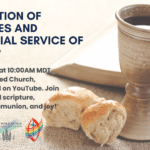Many communities of faith are gathering data from members and adherents to facilitate connections for worship, pastoral care, stewardship requests, and/or governance matters. Please think through your approach carefully, because (predictably) Coronavirus scammers are also hard at work.
If you’re phoning, messaging, or emailing a member of your community of faith to update contact information, please also share a contact number for the church office, minister or known person on your governing body. Those receiving the request can call to verify the legitimacy of the request before sharing their personal contact information. Where possible, people who know the person you need to contact should take the lead in calling or emailing them.
Please advise congregants to read emails carefully, and to follow these recommendations.
- If something feels “off”, right click on the sender’s email address, even if it appears to come from someone you know.
- If the email address has a totally unfamiliar domain name (@….) or is a series of letters and numbers, delete the email. Don’t respond to it and do NOT click on any links in the email.
- If you get a phone call asking for money, even if you think it may be legitimate, ask for the person’s name, organization, and phone number. Say you need to think about their request and you’ll call them back. If they object, that should be your first clue that the request is not legitimate.
- If the caller is offering coronavirus-related services or information, or is asking you for personal information in order to send you coronavirus information, don’t engage. Don’t even succumb to the temptation to play bad music loudly into the phone. Just hang up.
Thank you for your careful attention to your congregation’s safety, and for sharing this information widely.






